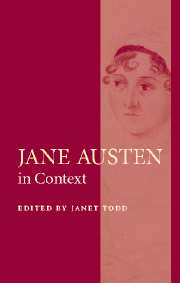33 - Politics
Published online by Cambridge University Press: 19 December 2020
Summary
Saturday, 16 December 1775, was Jane Austen's birthday. It was also the anniversary of a key event in English political and constitutional history: the signing of the Bill of Rights in 1689. By this Act, civil and political rights in England were guaranteed by Parliamentary authority in matters of law and taxation. The right to petition the King was established, and the maintenance of a standing army without consent of Parliament was declared illegal. The Bill also secured free elections, and freedom of speech in Parliament.
In Austen's lifetime the English Bill of Rights was a powerful influence on revolutionary changes of government in America (1774–6) and Europe (1789). From the 1760s tension between Britain's American colonies and the ‘mother country’ had steadily increased. Imports from Britain and Ireland were boycotted, and the Tea Act of 1773 – which was intended to secure amonopoly for the East India Company – met with active opposition across the Atlantic. On 16 December 1773, two years before Austen's birth, men disguised as Indians dumped a cargo of tea overboard, in what became known as the Boston Tea-Party. By drawing the population together, this protest helped to link the colonies in opposition to British rule. Close co-operation between the American provinces led up to the First Continental Congress held at Carpenters’ Hall, Philadelphia, in September 1774. Congress resolved to halt trade with Britain and issued a Statement of Rights and Grievances on matters of government and taxation. For the moment they stopped short of an outright break, but the route to conflict and American independence had been opened. When the American Constitution was drawn up in 1787 it echoed the English Bill of Rights; in September 1789 amendments to the Constitution were ratified as the American Bill of Rights, and by this date the flame of liberty had crossed the Atlantic to kindle another revolution in France.
‘What an eventful period is this! I am thankful I have lived to it.’ So the French Revolution of 1789 was greeted in London by the Unitarian Richard Price.
- Type
- Chapter
- Information
- Jane Austen in Context , pp. 357 - 365Publisher: Cambridge University PressPrint publication year: 2005

